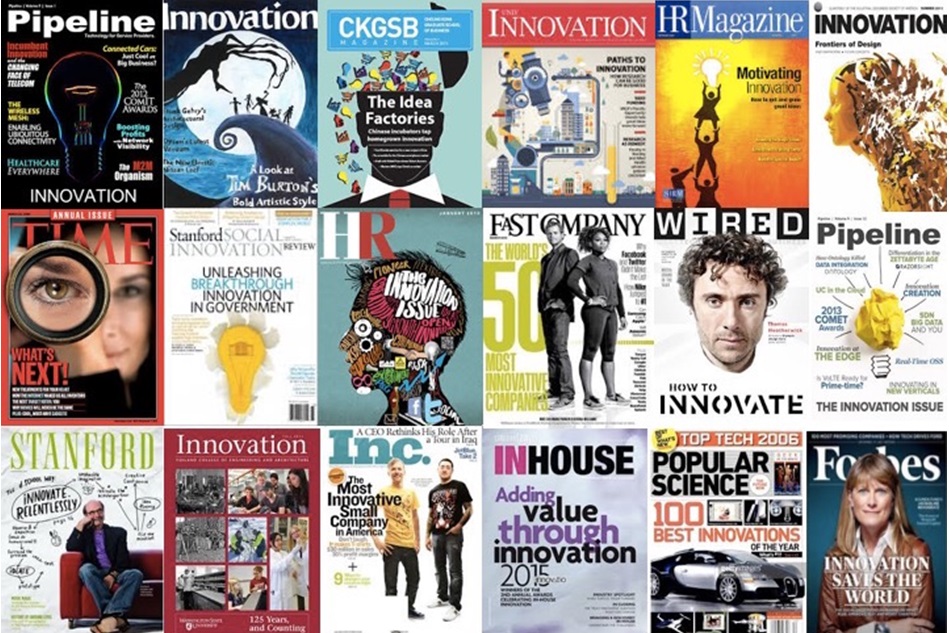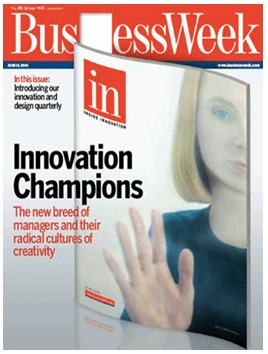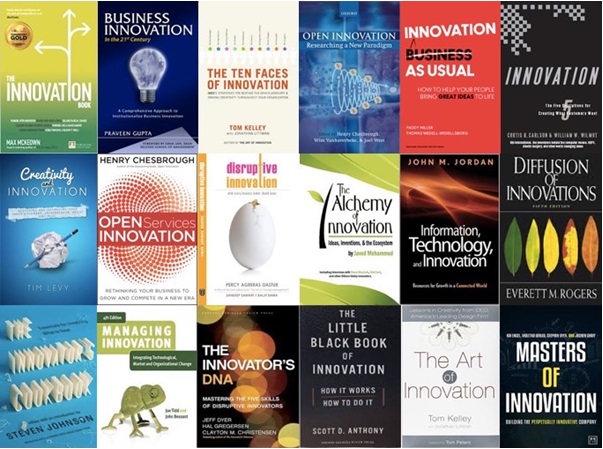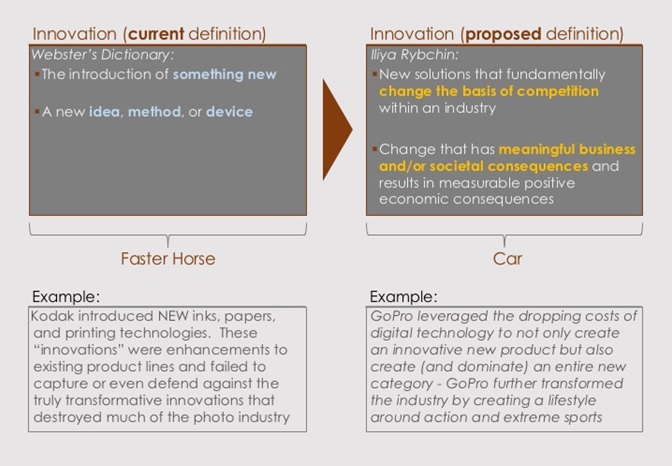Whenever I hear or see the word “innovation,” a feeling of nausea washes over me. Unlike other cliché buzzwords (synergy, paradigm shift, value-add, etc.) that I have forced myself to accept, I’m afraid “innovation” is one I may never be able to stomach.
The word is the corporate equivalent of Valleyspeak linguistic fillers such as “like”, “totally”, or “bro.” It is devoid of meaning but used liberally by executives, journalists, and even politicians.
Before I get too far, it’s important to establish my bona fides. I’m not a luddite or a curmudgeon, or even a run-of-the-mill malcontent. I have actually spent most of my adult life innovating. As a university student, I was building websites when most people were still figuring out how to use fax machines. Long before Marc Andreessen invented the modern web browser, I coauthored an “Exploring the Internet” chapter of a McGraw-Hill college textbook. After graduating, I spent 20+ years working in and running innovation labs, R&D groups, corporate strategy teams, and new business development departments at some of the most innovative companies in the world. I’ve built products and businesses and more recently put my money where my mouth is by investing in early stage startups.
Early in my career the word innovation meant something. Not anymore.
AI Weekly
The must-read newsletter for AI and Big Data industry written by Khari Johnson, Kyle Wiggers, and Seth Colaner.
Included with VentureBeat Insider and VentureBeat VIP memberships.
I think the word lost its meaning for me back in the mid 2000s when magazines starting devoting entire issues to the topic of innovation.

BusinessWeek identified 25 innovation champions in a 2006 cover issue. The list included the SVP of Innovation at Kimberly-Clark, whose tireless efforts helped introduce us to Poise Panty (an adult diaper), and the Unilever “Innovation Champion,” who transformed our world by bringing us pyramid-shaped tea bags. Jony Ive from Apple made the list, but he only ranked 12th. Ahead of him was the director of innovation for WD-40, who made everyone’s lives better by solving the age old conundrum of how to put WD-40 into a pocket-sized container.
 The BusinessWeek issue was a great example of how the word “innovative” has become watered down. It doesn’t describe trail-blazing pioneers who push boundaries and bring us solutions that transform industries and make our lives better. These days, it describes someone who has modified an adult diaper or figured out how to stuff grease into a small tube.
The BusinessWeek issue was a great example of how the word “innovative” has become watered down. It doesn’t describe trail-blazing pioneers who push boundaries and bring us solutions that transform industries and make our lives better. These days, it describes someone who has modified an adult diaper or figured out how to stuff grease into a small tube.
This new definition hit me in the face (and prompted me to write this article) on a recent trip to Costco. As I went about my business, I started to count the number of times I saw this overused word. I stopped counting at 17, and I’d barely made it halfway into the store. A note to marketers:
- A curved flat screen TV is not innovative.
- A room humidifier with a remote control is not innovative.
- A home bartending kit that comes with a scale to measure alcohol is not innovative.
- A vinyl LP player with pause and record features is not innovative.
These are not examples of innovation — these are examples of business as usual.
An electronics company adds cool-sounding features to convince consumers to buy a new TV. That’s laudable. However, doing something you have to do every year is not innovation, it’s called doing your job.
The word has become a catch-all for anything that isn’t old, established, outdated, or representative of the status quo. Technically, this is not incorrect. Many thesauruses may list “innovative” as a synonym for new. However, we must hold the word “innovation” to a higher standard.
We live in a time when our world needs real innovation.
We face massive problems and opportunities that won’t be solved by incremental baby steps. The next great leaps in business, technology, healthcare, education, and government will never come if we continue to glorify incremental progress. The latest social app is not innovation; it doesn’t solve important problems, and it doesn’t improve lives (except those with excess narcissism and excess spare time).
- Healthcare needs a structural transformation of the patient-payer-provider bonds and novel applications of data, AI, and outcome-based billing. It doesn’t need another app that analyzes your poo.
- Financial services needs a complete overhaul of a bloated and complex tax code along with rebalancing of the playing field to give individuals the same advantages enjoyed by corporations, hedge funds, and billionaires. It doesn’t need another Twitter-based investment tool.
- Education needs a complete reimagining of our commonly accepted and outdated pedagogy and an outright revolt against the tenured, unionized, and fossilized experts, administrators, and practitioners. It doesn’t need another online course or MOOC.
- Media needs a fundamental rebalancing of the creator-consumer relationship and a recalibration of content’s value, usage, and dissemination. It doesn’t need another obnoxious display ad unit
These are just a few industries where innovation is not just something to talk about in annual reports, press releases, and corporate marketing materials. In these industries, real innovation will determine winners or losers. Companies that continue to set a low bar for innovation will simply not survive. Real innovation requires audacious efforts and the willingness to fail.
History is littered with examples of companies that were busy inventing faster horses while someone else was inventing a car. In the early 2000s, Kodak was busy showcasing innovative new inks, innovative home printer solutions, and innovative photo paper. Around the same time, Nick Woodman was launching GoPro. 10 years later, Kodak was bankrupt and GoPro was preparing for a $3 billion IPO (interestingly enough, today it’s GoPro that has stopped innovating).
The business world is filled with countless books and articles containing definitions for innovation, most written by academics, consultants, and self-proclaimed “innovation gurus” who have never shipped product, built businesses, opened new markets, or even run a P&L. Some definitions focus on creativity, while others are so broad that virtually anything could be described as innovative. One very popular book, The Little Black Book of Innovation, written by a Harvard academic/innovation consultant, defined it as “Something different that has impact.” By that definition, we can clearly count adult diapers and pyramid tea bags as innovative.

To sort out diapers from real innovation, I propose a simple and clear two-part definition:
- New solutions that fundamentally change the basis of competition within an industry
- Change that has meaningful business and/or societal consequences and results in measurable positive economic consequences.
Only solutions that meet both of the above criteria deserve the be called innovative.
I have no issue with the frequency of the word’s usage — I struggle with inaccuracy. Nothing would make me happier than to see the word innovation everywhere as long as it truly described things that were innovative. The word has been diluted to a point where, when we do see it, we tune it out. Like the boy who cried wolf, people, companies, politicians, and journalists have used the word to get attention. Through incorrect application of the word, worthy innovations may fail to get attention. We will be too busy ogling the latest social app to notice a massive breakthrough.

When NASA achieved JFK’s goal of putting a man on the moon, it somehow managed to accomplish that without any bestselling innovation books, using a 10-step innovation processes, or employing innovation consultants. By any definition of the word, putting a man on the moon was innovative. It changed the basis of competition in the space race, and it had meaningful societal consequences for decades to come. Everyone working on the moon landing knew they were innovating — the word meant something.
In order to truly innovate, we must all pledge to make innovation more than just another consultant-driven management gimmick like BPM or 6 Sigma. We must avoid following 10-step innovation processes and reading books about “innovation culture.” Instead, we must simply raise the bar for what constitutes innovation. We must commit to audacious goals and be driven to achieve them.
Iliya Rybchin is director of the Media & Entertainment Practice at Highnote Foundry — a firm that identifies, funds, and operates startups that are solving complex problems in traditional industries.
VentureBeat's mission is to be a digital town square for technical decision-makers to gain knowledge about transformative enterprise technology and transact. Learn More
